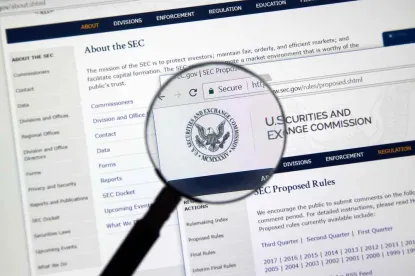As we recently noted (see our Corporate & Securities Law blog from October 26, 2022, “SEC Adopts New Executive Compensation Clawback and Disclosure Rule”), in accordance with Section 954 of the Dodd-Frank Wall Street Reform and Consumer Protection Act (the “Reform Act”), the Securities and Exchange Commission (the “SEC”) issued a press release and published final regulations (Release No. 34-96159) (the “Final Rules”) regarding so-called “Clawback Policies”. The Final Rules require specified publicly-held companies to adopt, disclose and maintain a policy to recover incentive compensation which was previously paid to specified company executive officers based on financial statements that were subsequently restated by the company such that the overpaid incentive compensation needs to be repaid back to the company by the executive officers. In our September 6, 2022 blog, “The Seven Year Wait is Over! SEC Finalizes New Pay Versus Performance Disclosure Regulations”, we had commented that there had been a seven year duration between SEC proposed regulations and final regulations with respect to pay versus performance disclosure rules and now for Clawback Rules there has also been a similar seven year waiting period between proposed and final rules which has finally come to a conclusion. This blog provides further details on the new SEC Clawback Policy regulations although we note that there are many nuances within the Final Rules that go beyond the scope of this blog article.
As we observed in our blog from July 26, 2010 “The Regulatory March to Reform Executive Compensation Practices Takes Another Step Forward”, the Reform Act implemented numerous new laws affecting executive compensation and corporate governance at publicly-held companies. Section 954 of the Reform Act directed the SEC to adopt rules requiring the national securities exchanges to prohibit the listing of companies that do not have a policy: (i) disclosing their policy on incentive compensation which is based on financial statement information and (ii) which, in the event of a financial accounting restatement due to material noncompliance with any financial reporting requirement, would recover from current/former executive officers any incentive compensation (including stock options) that would not have been paid under the restated financials (“Erroneously Awarded Compensation”). In particular, Erroneously Awarded Compensation is incentive compensation that is granted, earned, or vested based wholly or in part upon the attainment of any financial reporting measure and for which an executive officer would not have been entitled to receive had the financial statements been accurately presented. Financial reporting measures generally are measures that are determined and presented in accordance with the accounting principles used in preparing the company’s financial statements, and any measures derived wholly or in part from such measures.
The below provides a brief overview of the Final Rules in question and answer format.
What Generally Will The Final Rules Do?
The Final Rules add new Rule 10D-1 to regulations promulgated under the Securities Exchange Act of 1934, as amended. Rule 10D-1 compels national securities exchanges and associations (which list securities) to establish listing standards that generally require their listed issuers to:
-
maintain a written policy for recovery of Erroneously Awarded Compensation received by its current or former executive officers if the issuer prepares an accounting restatement due to its material noncompliance with any financial reporting requirement under the securities laws, during the three completed fiscal years immediately preceding the date that the issuer is required to prepare an accounting restatement;
-
publicly disclose their compensation recovery policies, including providing the information in tagged data format;
-
file their written recovery policies as exhibits to their annual reports;
-
check the applicable box on their annual reports as to whether their financial statements reflect correction of an error to previously issued financial statements and whether any of those error corrections are restatements that required an analysis of recovery of incentive compensation; and
-
disclose any actions they have taken pursuant to such recovery policies.
Which Companies Will be Required to have Clawback Policy?
The Final Rules generally apply to all publicly-held companies whose securities are listed on an exchange or association. Unlike many other instances in which SEC rules addressing executive compensation provide for relaxed standards for smaller reporting companies, emerging growth companies, or foreign private issuers, the Final Rules do not provide any such relief or exemption. Moreover, the exchanges will not have discretion to exempt certain categories of securities from the Clawback Policy rules.
Which Events Will Trigger a Clawback of Erroneously Awarded Compensation and What Time Period is Covered by the Clawback Policy?
The Final Rules require listed issuers to have a written compensation recovery policy for which recovery of Erroneously Awarded Compensation will be triggered in the event the issuer is required to prepare an accounting restatement that corrects an error in previously issued financial statements that is material to the previously issued financial statements, or that would result in a material misstatement if the error were corrected in the current period or left uncorrected in the current period.
Under the Final Rules, companies must generally prepare an accounting restatement on the earlier of the date the company concludes (or should have concluded) that it is required to prepare an accounting restatement due to the material noncompliance of the company with financial reporting requirements under the securities laws or the date a court directs the company to prepare an accounting restatement.
The time period covered by the recovery policy for which Erroneously Awarded Compensation will be subject to clawback by the company will be the three completed fiscal years immediately preceding the date the company is required to prepare an accounting restatement.
Which Employees Are Required to be subject to the Clawback Policy?
The Final Rules state that the company’s former and current executive officers (which could be an executive officer of the company’s parent or subsidiary entities) are the persons whose incentive compensation is subject to the Clawback Policy. The Final Rules provide its own definition of an executive officer which is an: “issuer’s president, principal financial officer, principal accounting officer (or if there is no such accounting officer, the controller), any vice-president of the issuer in charge of a principal business unit, division, or function (such as sales, administration, or finance), any other officer who performs a policy-making function, or any other person who performs similar policy-making functions for the issuer”.
Which Incentive Compensation is Subject to Clawback?
The amount of incentive based compensation received by the executive officer that exceeds the amount of incentive-based compensation that otherwise would have been received had it been determined based on the accounting restatement, computed without regard to taxes paid, is the amount that can be subject to clawback. The Final Rules also provide that, for incentive-based compensation based on total shareholder return or stock price, where the amount of Erroneously Awarded Compensation is not subject to mathematical recalculation directly from the information in an accounting restatement, the amount must be based on a reasonable estimate of the effect of the accounting restatement on the applicable measure and the issuer must maintain documentation of the determination of that reasonable estimate and provide it to the exchange. Generally speaking, all Erroneously Awarded Compensation must be recovered by the issuer unless is impractical to do so which is intended to be a very limited set of circumstances.
What Clawback Policy Disclosures will need to be made?
The Final Rules require companies to file their Clawback Policy as an exhibit to their Form 10-K annual report. In addition, the cover page of a company’s annual report on Form 10-K will include check boxes that indicate separately (a) whether its financial statements reflect correction of an error to previously issued financial statements and (b) whether any of those error corrections are restatements that required a recovery analysis of incentive-based compensation. If there is a need to recover Erroneously Awarded Compensation then the company will need to make certain disclosures regarding such recovery in its proxy statement.
When will the Final Rules become Effectve?
The Final Rules will become effective 60 days following their publication in the Federal Register. Exchanges will be required to file proposed listing standards no later than 90 days following this publication in the Federal Register, and the listing standards must be effective no later than one year following such publication. Companies will be required to adopt a recovery policy no later than 60 days following the date on which the applicable listing standards become effective.
What’s Next?
Publicly-held companies who will be subject to the Final Rules and who do not presently have a Clawback Policy should take actions to adopt a compliant policy. Companies that do already have a Clawback Policy should review it and make modifications as appropriate to ensure compliance with the Final Rules. While the Final Rules impose minimum standards for the recoupment of Erroneously Awarded Compensation, companies are free to implement more expansive policies such as for example covering more employees or also imposing a clawback due to the commission of bad acts by a covered person.



 />i
/>i

